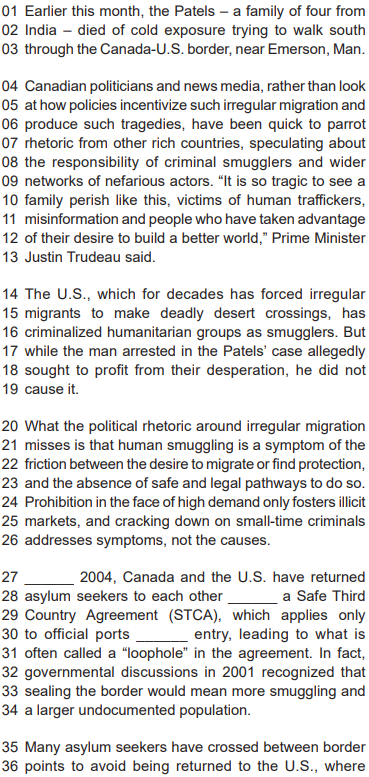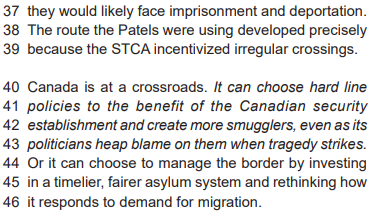Questões de Vestibular Comentadas sobre inglês
Foram encontradas 799 questões
“– Listen, God love everything you love – and a mess of stuff you don't. (…) It always making little surprises and springing them on us when us least expect. (…) Man corrupt everything (…) He try to make you think he everywhere (…), you think he God. But he ain't. (…) I start to wonder why us suffer. Why us black. It didn’t take long to realize I didn’t hardly know nothing.”
(Adaptado de: WALKER, Alice. The Color Purple. London: The Orion Publishing Group, 1983.)
Assinale a alternativa que preenche corretamente as lacunas no trecho a seguir:
É correto dizer que o excerto apresenta aspectos linguísticos – que diferem dos observados na variedade padrão – como (i) _________, e que sua temática central é a (ii) ________.
“Hey there. You're probably wondering why you're getting this e-mail. The truth is, I put some malware on a website that you visited. My malware took control of your browser and recorded everything, including your contacts from your messenger, Facebook, and e-mail account. To top it all off, I also took videos of you. So I'll give you the option to make a deal before I do anything with it.”
(Adaptado de: https://mashable.com/article/chatgpt-scary-uses. Acesso em 12/05/2023.)
O e-mail criado pelo programa chama a atenção
I have a dream that one day down in Alabama, with its vicious racists, with its governor having his lips dripping with the words of interposition and nullification; that one day right down in Alabama little black boys and black girls will be able to join hands with little white boys and white girls as sisters and brothers (Martin Luther King, 1963).
(Adaptado de: https://kr.usembassy.gov/martin-luther-king-jr-dream-speech-1963/. Acesso em 26/05/2023.)

Considere os dois textos e assinale a alternativa correta.
Besides these, another result of hustle culture is the one below:
The author presents a series of questions in the first paragraph.
These questions are used with the following purpose:

The nouns below that are formed from adjectives are



“It can choose hard line policies to the benefit of the Canadian security establishment and create more smugglers, even as its politicians heap blame on them when tragedy strikes.”




( ) The last sentence in Text 1 (lines 44 to 46) presents two examples of adjectives in the comparative degree. ( ) “avoid being returned” (line 36) is about an action that will/would happen while “remember being arrested” is about an action that has already happened. ( ) The two instances of the word “such” (lines 05 and 06) have the same idea as “such” in “I cannot imagine anyone living on such a small salary”.
The alternative that presents the correct top-down sequence of answers to the sentences above is






The paragraph below was taken out of Text 1.
“Just three months earlier, the U.K.’s Interior Minister blamed smugglers for the death of 31 people when a boat capsized, and vowed to pass laws to make it illegal to claim asylum.”
After which paragraph in the text can it be placed
back?


This text refers to question
How to Stop Eating Sugar
By David Leonhardt
If you’re like most Americans, you eat more sugar than is good for you. But it’s entirely possible to eat less sugar without sacrificing much — if any — of the pleasures of eating. Surprising as it may sound, many people who have cut back on sugar say they find their new eating habits more pleasurable than their old ones. This guide will walk you through why sugar matters, how you can make smart food choices to reduce sugar consumption, and how you can keep your life sweet, even without so many sweets.
Here's why you eat more sugar than you realize, and why it's a problem. The first thing to know: Added sugars, of one kind or another, are almost everywhere in the modern diet. They’re in sandwich bread, chicken stock, pickles, salad dressing, crackers, yogurt and cereal, as well as in the obvious foods and drinks, like soda and desserts.
The biggest problem with added sweeteners is that they make it easy to overeat. They’re tasty and highly caloric but they often don’t make you feel full. Instead, they can trick you into wanting even more food. Because we’re surrounded by added sweeteners — in our kitchens, in restaurants, at schools and offices — most of us will eat too much of them unless we consciously set out to do otherwise.
It’s not an accident. The sugar industry has conducted an aggressive, decades-long campaign to blame the obesity epidemic on fats, not sugars. Fats, after all, seem as if they should cause obesity. Thanks partly to that campaign, sugar consumption soared in the United States even as people were trying to lose weight. But research increasingly indicates that an overabundance of simple carbohydrates, and sugar in particular, is the No. 1 problem in modern diets. Sugar is the driving force behind the diabetes and obesity epidemics. Fortunately, more people are realizing the harms of sugar and cutting back.
[...]
Changing your diet is hard. If your strategy involves thinking about sugar all the time — whenever you’re shopping or eating — you’ll likely fail. You’ll also be miserable in the process. It’s much more effective to come up with a few simple rules and habits that then become second nature. (One strategy to consider: Eliminate all added sugars for one month, and then add back only the ones you miss. It’s easier than it sounds.)
Above all, most people’s goal should be to find a few simple, lasting ways to cut back on sugar. Once you’re done reading this guide, we suggest you choose two or three of our ideas and try them for a few weeks.
https://www.nytimes.com/guides/smarterliving/how-to-stop-eating-sugar (text adapted)

